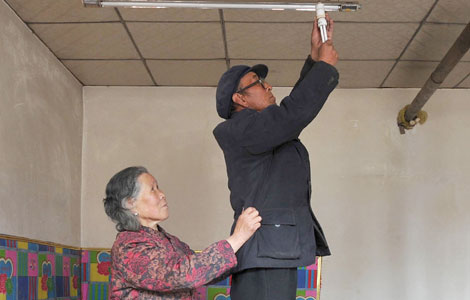China solar panel duties to delay EU grid parity
Updated: 2013-05-29 10:46
(Xinhua)
|
|||||||||||
BRUSSELS - As the European Union's solar panel dispute against China continues, industry insiders warn punitive duties would derail Europe's path towards grid parity.
Hermann Klughardt, director-general of Voigt und Collegen, a leading asset manager focusing on renewable energy, warned that such action would delay the process of grid parity. "Punitive tariffs would increase the costs for new photovoltaic plants, but not rescue European module manufacturers," Klughardt said.
Grid parity for solar power means the price of unsubsidized solar electricity is equal or less than the price of purchasing power from the electricity grid or with government support. Reaching grid parity marks a shift from traditional way of power generation towards a more "green" one.
According to an analysis prepared by the European Photovoltaics Industry Association, grid parity for residential sector and commercial sectors is in sight in many European countries. The survey shows grid parity was beginning to be achieved in Germany, southern Italy, the Netherlands and Spain in 2012. This will be followed by northern Italy, Portugal and Austria in the next two years and progressively by other countries.
"Grid parity has been already reached in some sun-rich regions in southern Europe: there solar energy can be produced without subsidization at the same costs as energy from traditional energy resources," Klughardt said.
But this may only come at a time when feed-in tariff (FiT) is high. The reduction of FiT after 2012, especially in Germany, poses a great problem for the industry. High production costs of European producers will not be helpful to lowering solar power rates, especially with subsidies disappearing.
A subsidy-free era means higher costs for solar products for Europe if punitive duties ban cheap imports from entering European market. High costs of solar products may raise the cost of solar electricity and delay the process of grid parity in Europe.
"This will be realized in other European regions in the upcoming years as well, if EU punitive tariffs do not impede grid parity," said Klughardt.
Related Stories
China pledges solar action 2013-05-29 08:03
EU members against punitive duties on Chinese solar panels 2013-05-28 09:25
Chinese solar firms protest over EU duties 2013-05-24 10:09
Germany at odds with Brussels over solar tariffs 2013-05-23 10:18
Solar negotiations with EC fail 2013-05-23 09:12
EU solar duties against China 'mistake' 2013-05-21 09:52
Today's Top News
Germany to pay $1b for ageing Holocaust victims
Beijing seeks cooperation with US on cyberattacks
China to speed up service growth
Infant's fall in pipe probed
Developer invests $1.5b in London
Schoolchildren taught to avoid sexual assault
Traffickers await appeal verdict
Female condoms, a new choice
Hot Topics
Lunar probe , China growth forecasts, Emission rules get tougher, China seen through 'colored lens', International board,
Editor's Picks

|

|

|

|

|

|





